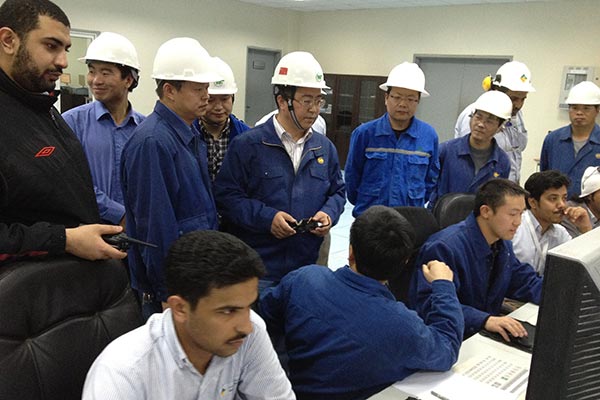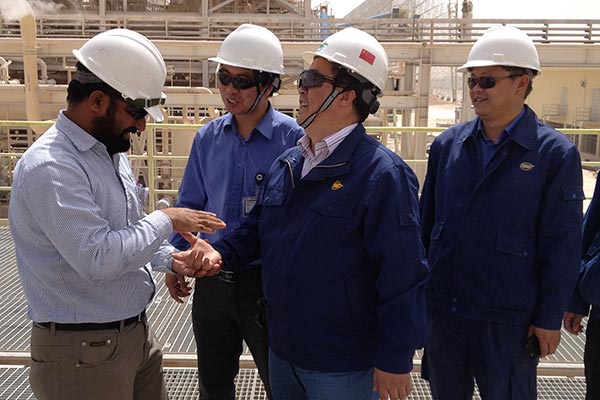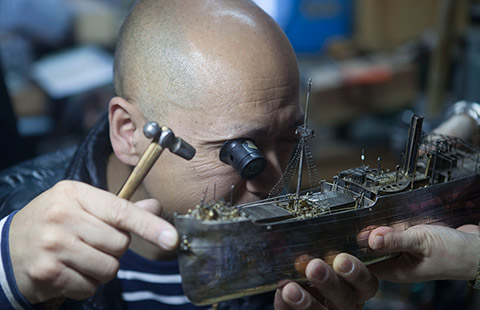Phosphorus giant Wengfu stamping footprint overseas
By Zhu Wenqian (China Daily) Updated: 2016-04-11 09:18
He Guangliang (in the middle with glasses), chairman of Wengfu Group, works with his company staff in the central control room of the phosphorus processing project in Saudi Arabia.[Provided to China Daily]
Phosphorus giant Wengfu expands by exploiting business presented by the Belt and Road Initiative

The company was founded in the 1990s, and has since mastered phosphorus mining technology, which helps it in extracting 95 percent of phosphorus out of phosphate ore after removing impurities.
The technology also helps lower Wengfu's costs and raises the recovery rate at production.
In 2007, using its advanced technology and management experience, Wengfu outplayed many big enterprises in Europe and the United States to win the bid for the then world's largest mineral processing project in Saudi Arabia.
From 2008 to 2015, Wengfu signed several contracts with Saudi Arabian companies, and the total contract amount reached $550 million. Over the seven-year period, Wengfu earned a profit of 878 million yuan ($135 million).
Jin Gang, assistant general manager and senior economist at Wengfu, said Saudi Arabia appeared rich in natural resources like phosphorus, petroleum reserves and natural gas. The country is keen on achieving high and rapid growth, but lack advanced technologies to process its natural resources.
"Wengfu is mainly responsible for technology and management guidance in Saudi Arabia, and local firms send their own workers," Jin said.
Wengfu, he said, has also driven the growth of other related equipment enterprises in China, and helped them to expand overseas by taking their assistance in the operations of the phosphorus project in Saudi Arabia.
The country, located in the heart of the Persian Gulf and along the Silk Road, has significant resources and rising demand for modern resource-processing technology, he said.
Jin further said the country boasts a culture that is different from China's. Adapting to it and mingling with locals is not easy. West Asian countries have sound, strict legal systems, and it is essential for the Wengfu staff to obey the local laws, respect social customs and the Islamic faith, he said.
 |
|
He Guangliang (second from right), chairman of Wengfu Group, talks with a Saudi Arabian businessman on the site of the operation and maintenance of phosphorus processing project in Saudi Arabia.[Provided to China Daily] |
In the past, China lacked phosphorus resources and could not exploit technologies, leading to reliance on imports from the US. But Wengfu learned and innovated on its own, eventually developing China's own technologies.
Now the company boasts key national laboratories and work stations for post-doctoral researchers. It has become a technology- and export-oriented enterprise, and owns thousands of related patents.
"Back in 2007 and 2008, Wengfu suffered a loss in its domestic operations because of the (global) financial crisis. The Saudi Arabia project, which took around two years to complete, helped save the company through intellectual property exports," Jin said.
Wang Jiangping, deputy director general at the State Administration for Industry and Commerce, and former deputy governor of Guizhou, said: "It is impossible for all industrial sectors in Guizhou to rank at the top of the world. However, some companies such as Wengfu Group can lead world markets through technological innovation and brand-building."
Saudi Arabia is not the only overseas market for Wengfu. The introduction of the Belt and Road Initiative provides significant growth potential for dozens of countries along the route to integrate with the global economy.
Wengfu has grabbed the opportunities to carry out cooperation projects with many companies in the West Asian and African markets, including Oman, Jordan, Iran, Tunisia, Kenya and Kazakhstan.
Currently, in Jordan, a local company plans to cooperate with China Minmetals Corp in Chongqing, and produce high-end phosphorus and potassium fertilizer by utilizing its rich phosphorus and potassium resources. Wengfu will serve as the consultant, and work on a feasibility study for project design.
"The project in Saudi Arabia helped a lot of our staff to gain valuable experience in overseas project management and engineering construction. This paved the way for our further expansion in other markets," Jin said.
- Asian businesspeople ride China's 'Belt and Road'
- Phosphorus giant Wengfu stamping footprint overseas
- Chinese company helps Botswana employee realize house dream
- Home decoration goes DIY and online in China
- New tax rules on overseas buying to benefit Chinese retailers: Fitch
- Industrial city Liuzhou turns to rice noodles for growth
- Ministry says e-commerce tax brings no trouble for tourists
- Foreign capital to chase China's A shares

















